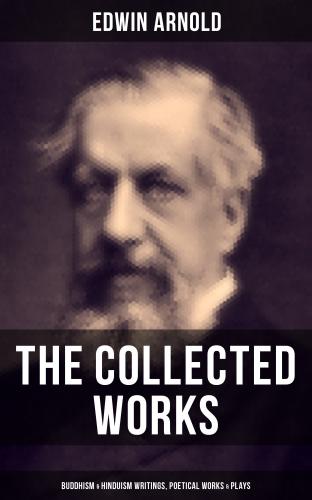My son, tell me thy sorrow, that it may become more endurable by participation.—Nagananda.
Every variety of living creature I must ever defend from harm.—Ta-chwang-yan-king-lun.
To think no evil and do none: on the contrary, to benefit all creatures.—Fo-pen-hing-tsih-king.
Let the wise man guard his thoughts, for they are ... very artful and rush wheresoever they list.—Dhammapada.
When thou seest righteousness, quickly follow it: when thou seest iniquity, instantly flee.—Jitsu-go-kiyo.
Like as the lotus is untarnished by the water, so is Nirvana by any evil dispositions.—Questions of King Milinda.
May I never, even in a dream, be guilty of theft, adultery, drunkenness, life-slaughter, and untruthfulness.—Attanagalu-vansa.
Spotless even as the moon, pure, serene, and undisturbed.—Vasettha-sutta.
Practice the most perfect virtue.—Udanavarga.
To attain perfection that he may profit others.—Fo-pen-hing-tsih-king.
The present is an imperfect existence: ... I pray for greater perfection in the next.—Inscription in Temple of Nakhon Vat.
Fulfil the perfection of long-suffering; be thou patient under ... reproach.—Introduction to Jataka Book.
My duty is to bear all the insults which the heretics launch against me.—Buddhaghosa's Parables.
Silently shall I endure abuse, as the elephant in battle endures the arrow sent from the bow.—Dhammapada.
Let not the member of Buddha's order tremble at blame, neither let him puff himself up when praised.—Tuvataka-sutta.
The end of the pleasures of sense is as the lightning flash: ... what profit, then, in doing iniquity?—Fo-sho-hing-tsan-king.
Cultivate equanimity.—Nalaka-sutta.
Abhor dissimulation!—Fo-sho-hing-tsan-king.
He speaks truth unmixed with falsehood.—Samanna-phala-sutta.
There is guilt (calling for repentance) in prevarication.—Patimokkha.
He that praises him who should be blamed, or blames him who should be praised, gathers up sin thereby in his mouth.—Kokaliya-sutta.
The member of Buddha's order should abstain from theft, even of a blade of grass.—Mahavagga.
From bribery, cheating, fraud, and (all other) crooked ways he abstains.—Tevijja-sutta.
The Scripture moveth us, therefore, rather to cut off the hand than to take anything which is not ours.—Sha-mi-lu-i-yao-lio.
Let him not, even though irritated, speak harsh words.—Sariputta-sutta.
From this day forth, ... although much be said against me, I will not feel spiteful, angry, enraged, or morose, nor manifest anger and hatred.—Anguttara-Nikaya.
Upright, conscientious and of soft speech, gentle and not proud.—Metta-sutta.
Even as the lily lives upon and loves the water,
So Upatissa and Kolita likewise,
Joined by closest bond of love,
If by necessity compelled to live apart,
Were overcome by grief and aching heart.
—Fo-pen-hing-tsih-king.
(The true friend) forsakes you not in trouble; he will lay down his life for your sake.—Sigalovada-sutta.
In grief as well as in joy we are united,
In sorrow and in happiness alike.
* * * * *
That which your heart rejoices in as good,
That I also rejoice in and follow.
It were better I should die with you,
Than ... attempt to live where you are not.
—Fo-pen-hing-tsih-king.
When first I undertook to obtain wisdom,
Then also I took on me to defend (the weak).
All living things of whatsoever sort
Call forth my compassion and pity.
—Ta-chwang-yan-king-lun.
Fault is not to be found unnecessarily—Ta-chwang-yan-king-lun.
Judge not thy neighbor.—Siamese Buddhist Maxim.
What is it to you ... whether another is guilty or guiltless? Come, friend, atone for your own offense.—Mahavagga.
Even a king may be full of trouble; but a common man, who is holy, has rest everlasting.—Fo-sho-hing-tsan-king.
This world is afflicted with death and decay; therefore the wise do not grieve, knowing the terms of the world.—Salla-sutta.
Who that clings to Righteousness should be in fear of death?—Jatakamala.
Ye, then, my followers, ... give not way ... to sorrow; ... aim to reach the home where separation cannot come.—Fo-sho-hing-tsan-king.
Loving and merciful towards all.—Fo-sho-hing-tsan-king.
Filled with universal benevolence.—Fa-kheu-pi-u.
A friend to all creatures in the world.—Saddharma-pundarika.
Bent on promoting the happiness of all created beings.—Lalita Vistara.
Conquer thy greediness for sensual pleasures.—Jatukannimanavapuccha.
Therefore should we encourage small desire, that we may have to give to him who needs.—Fo-sho-hing-tsan-king.
Justly I seek for riches, and having sought for riches justly, I give of my ... justly acquired wealth to one, to two, to three, ... to a hundred.—Magha-sutta.
They sought their daily gain righteously; no covetous, money-loving spirit prevailed; with pious intent they gave liberally; there was not a thought of any reward.—Fo-sho-hing-tsan-king.
There is in charity a proper time and a proper mode.—Fo-sho-hing-tsan-king.
Better would it be to swallow a red-hot iron ball than that a bad, unrestrained fellow should live on the charity of the land.—Dhammapada.
Our duty to do something, not only for our own benefit, but for the good of those who shall come after us.—Fo-pen-hing-tsih-king.
Have respect for the aged as though they were thy father and mother; love the young as thy children or younger brethren.—Jitsu-go-kiyo.
All the people were bound close in family love and friendship.—Fo-sho-hing-tsan-king.
Happy ... is the man that honors his father: he also that honors his mother is happy.—Udanavarga.
How should I be capable of leaving thee in thy calamity?... Whatever fate may be thine I am pleased with it.—Jatakamala.
He is my husband. I love and revere him with all my heart, and therefore am determined to share his fate. Kill me first, ... and afterwards do to him as you list.—Fo-pen-hing-tsih-king.
A heart bound by affection does not mind imminent peril. Worse than death to such a one is the sorrow which the distress of a friend inflicts.—Jatakamala.
This good man, moved by pity, gives up his life for another, as though it were but a straw.—Nagananda.
Sprinkle water on the seeds of virtue.—Story of Pratiharyya.
The fool thinks himself alone and commits sin. But I know of no lonely place at all.... Of a bad action my "Self" is a witness far more sharp-sighted than any other person.—Jatakamala.
What
